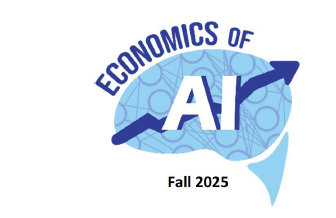
Applying Econ AI Course to the Labor Market (Fall and Spring 2025-26)
Hello,
This is a follow-up message to the ECO blast sent the week of June 2. Check out below Chat GPT's results!
Based on the content and learning objectives of ECON 4559: The Economics of AI, a student completing this course would gain interdisciplinary knowledge of artificial intelligence, economics, and workforce trends. This positions them well for a range of entry-level jobs that combine analytical thinking, research skills, and a foundational understanding of AI's impact on the economy and work. Below are two buckets of entry-level roles suited for econ majors, who have taken this class - Less Technical and More Technical.
✅ Less-Technical Friendly Entry-Level Roles
These roles don’t require programming or data science skills, though basic data literacy (Excel, charts, interpreting trends) is helpful.
🏛️ Public Sector
| Role | Employers | Why It Fits |
|---|---|---|
| Research Assistant (Policy or Economics) | Federal Reserve, Brookings, CBO, Urban Institute | Focuses on writing, economic data interpretation, and policy briefs. |
| Workforce Development Assistant | Local EDAs, State Labor Departments | Supports job programs, tracks trends, writes reports. |
| Policy Analyst (Junior Level) | NSF, Dept. of Labor, local governments | Emphasizes research and communication over coding. |
🏢 Private Sector
| Role | Business/Employer | Why It Fits |
|---|---|---|
| Business Analyst / Strategy Analyst (Non-technical focus) | McKinsey, Accenture, Lightcast, Handshake | Requires structured thinking, not code. Data is often pre-analyzed. |
| Product Operations or Market Research Associate | LinkedIn, Morning Consult, tech startups | Looks at user trends, economic impacts of tech, not backend dev work. |
| Talent Intelligence or Workforce Trends Analyst | HR tech companies, labor market firms | Tracks and explains how AI is affecting jobs. Good for econ students. |
🌐 Nonprofits, Think Tanks, Advocacy
| Role | Employer | Why It Fits |
|---|---|---|
| Program Assistant (Tech & Society) | Aspen Institute, Code for America | Organizing events, writing briefs, liaising with partners. |
| Tech & Economy Research Assistant | New America, RAND, Partnership on AI | Research-heavy roles — strong fit for economics + writing skills. |
| Communications / Content Associate | Center for AI & Digital Policy, AI Now Institute | Explaining AI's social impact to public and policymakers. |
🧠 Ideal Skills for These Non-Technical Roles
| Skill | Examples |
|---|---|
| Writing & Communication | Reports, briefs, stakeholder summaries |
| Critical Thinking | Interpreting data, connecting trends |
| Economic Reasoning | Labor market dynamics, cost-benefit analysis |
| Data Literacy (non-coding) | Excel, simple charts, interpreting dashboards |
| Curiosity about AI & society | Awareness of ethical, policy, workforce implications |
⚠️ Roles Possibly to Avoid (for Non-Technical Students)
These typically require coding, data science, or software engineering:
- Machine Learning Engineer
- AI Product Manager (technical track)
- Software Developer
- Data Scientist (without technical training)
🧭 Bottom Line:
Non-technical students from this course are well-suited for analyst, research, communications, and workforce development roles across sectors — especially if they can translate the impact of AI into economic, policy, or human-centered terms. These students can position themselves as "tech-literate generalists" who can connect AI trends to real-world systems and policy.
✅ Roles for those with More Developed Technical Skills:
Technology & Business Roles
- AI/Tech Strategy Analyst (Entry Level)
- Employers: Consulting firms, major corporations, or tech companies
- Relevance: Help businesses navigate how AI transforms industries and jobs.
- Product Analyst or Operations Analyst
- Employers: Tech companies, SaaS platforms, AI startups
- Relevance: Evaluate AI product features from a business impact and efficiency standpoint.
- Innovation/Transformation Analyst
- Employers: Management consulting firms, internal strategy teams
- Relevance: Study emerging tech like AI to support organizational innovation.
🧑💻 Career & Workforce Development Roles
- Workforce Development Associate
- Employers: Economic development authorities, career centers, labor-focused nonprofits
- Relevance: Help communities adapt to the AI-driven job market using insights from the course.
- Talent Intelligence Analyst
- Employers: HR tech firms, enterprise HR departments
- Relevance: Use economic insights to assess how AI is reshaping talent needs and job design.
🧠 Emerging Tech Awareness & Communication Roles
- Technology Policy Communications Associate
- Employers: Advocacy groups, research organizations
- Relevance: Translate complex economic and AI developments into accessible policy insights.
- Content Writer or Editor – AI and Society Focus
- Employers: Media outlets, academic publications, nonprofit think tanks
Relevance: Communicate key trends in AI and economics to the public or policymakers.